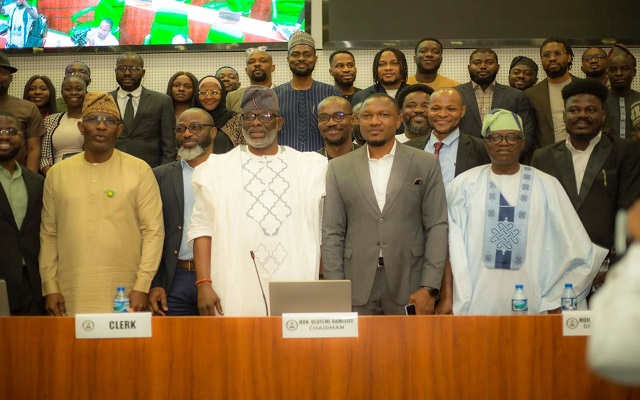In a major step toward shaping Nigeria’s digital finance future, the House of Representatives has begun moves to create a balanced and inclusive regulatory framework for cryptocurrency and Point-of-Sale (POS) operations in the country.
At a high-level engagement held recently in Abuja, the House Ad-Hoc Committee on the Economic, Regulatory and Security Implications of Cryptocurrency Adoption and POS Operations met with key regulators and Virtual Asset Service Providers (VASPs), represented through the Stakeholders in Blockchain Technology Association of Nigeria (SiBAN).
The session formed part of ongoing consultations aimed at developing a coherent national policy that safeguards investors, curbs illicit financial risks, and unlocks the economic potential of Nigeria’s fast-growing digital finance ecosystem.
Chairman of the Committee, Hon. Olufemi Bamisile, used the occasion to call for a downward review of the Securities and Exchange Commission’s (SEC) current ₦1 billion minimum capital requirement for cryptocurrency exchanges, describing the benchmark as “too steep” for emerging startups and innovators driving blockchain adoption in the country.
According to him, the legislature’s engagement with stakeholders reflects a broader commitment to striking the right balance between innovation, regulation, and national security in the evolving digital economy.
He grounded his stance in the need for regulations to protect investors without strangling innovation, arguing that Nigeria’s threshold is far higher than global norms, such as the European Union’s MiCA framework, and specifically addressed a critical inconsistency, noting that most Nigerian crypto firms do not hold customer funds but only manage the underlying technology.
He stressed that subjecting these pure technology-focused firms to the same high capital and insurance standards as those that hold investors’ funds is unfair and a view shared by various stakeholders, including investors and consumer groups.
This entire regulatory effort, which also saw remarks from the representative of Speaker of the House of Representative, Hon. Usman Kumo on the clear need for a robust framework, was driven by concerns over consumer protection and national security, as Bamisile highlighted the significant deficiency of many Nigerian Fintechs in providing robust consumer protection, warning that current widespread scams could ultimately compromise financial stability and national security.
The Committee’s recommendations centre on ensuring that regulations open doors, not close them, acknowledging that high barriers, such as the ₦1 billion capital requirement, would simply export our brightest minds as young entrepreneurs register their businesses abroad, resulting in lost jobs, skills, and tax revenue for Nigeria.
To promote local innovation and youth empowerment, the committee is championing a Nigeria first licensing pathway using a tiered approach. Under this model, firms with smaller capital exposure would operate under mandatory mentorship and joint compliance tracking between the SEC and the Central Bank of Nigeria (CBN).
As these firms grow and their capacity is proven, they would gradually graduate to higher tiers with broader responsibilities. This strategic mode is specifically designed to keep innovation thriving within Nigeria, build trust in the system, and support the President’s vision of inclusive economic empowerment.
The Stakeholders in Blockchain Technology Association of Nigeria (SiBAN), the foremost self-regulatory body for the sector, was a key stakeholder to the session.
SiBAN, led by its President Obinna Iwuno, presented a comprehensive memorandum to the Committee, chaired by Hon. Olufemi Bamisile, commending the House for its timely intervention.
The association acknowledged the Committee’s mandate to review regulatory gaps, investigate security implications, and develop a framework that protects consumers while harnessing innovation.
In its submission, SiBAN highlighted Nigeria’s position as a global leader in digital asset adoption, driven by a young and tech-savvy population. However, it pointed out that the industry is currently hampered by a fragmented regulatory landscape, with overlapping jurisdictions among the Central Bank of Nigeria (CBN), the Securities and Exchange Commission (SEC), and other agencies, creating operational uncertainty. SiBAN stressed that a cohesive, risk-based framework is urgently needed to foster growth and address issues like fraud and money laundering.
To achieve this coherence, SiBAN proposed a series of sweeping reforms, beginning with the enactment of an act for Blockchain Technology and Digital Assets. This proposed legislation would define and categorise digital assets, recognise blockchain as foundational infrastructure, and establish regulatory coherence across all agencies.
The association argued that this unified approach is necessary to align Nigeria with global benchmarks, such as the European Union’s Markets in Crypto-Assets Regulation (MiCA) and UAE’s Virtual Assets Regulatory Authority (VARA).
SiBAN noted that a National Council on Blockchain & Digital Assets should be established and situated under the Presidency, to serve as a central coordinating body to harmonise cross-agency standards, issue technical architectures, and manage a national multi-sector sandbox.
“This structure aims to ensure a single, adaptive institutional framework for rapid technological change and to prevent policy duplication,” it said.
Furthermore, the self-regulatory body advocated for a tiered licensing framework for operators differentiating between high-risk custodial services and lower-risk infrastructure providers to encourage innovation and market integrity.
It also called for local content requirements and policy incentives to protect Nigerian-owned firms from foreign dominance, reduction in the licensing fees, admittance of more operators into the Accelerated Regulatory Incubation Program, coupled with mandatory consumer protection measures like compulsory KYC, AML/CFT/CPF Compliance and dispute resolution through mechanisms such as SiBAN’s own Blockchain Dispute Resolution Panel (BDRP).
By adopting these proposals, SiBAN concluded, Nigeria could achieve significant national benefits including regulatory certainty, enhanced financial inclusion, reduced fraud, and increased job creation.
The association reaffirmed its readiness to collaborate, asserting that transitioning to a unified framework under the proposed actions would position Nigeria as a globally respected model for digital innovation governance.

